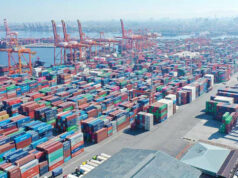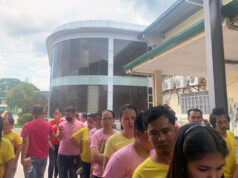By Janina C. Lim and Reicelene Joy N. Ignacio
Reporters
THE PHILIPPINES is looking forward to a pending World Trade Organization (WTO) agreement to eliminate fisheries subsidies, saying that such a deal would protect the country’s coastal waters from overfishing.
“As an archipelagic nation, with coastal communities and fisherfolk that rely on marine resources for food and livelihood, it is in the Philippines’ national interest that multilateral disciplines are in place to curtail fisheries subsidies that contribute to IUU fishing, overcapacity, and overfishing,” Ambassador Manuel A.J. Teehankee, Philippine Permanent Representative to the WTO, told BusinessWorld in an e-mail interview.
The WTO’s goal is to meet the United Nations Conference on Trade and Development’s Sustainable Development Goal (SDG) Target 14.6 which calls for a prohibition on certain forms of fisheries subsidies which contribute to overcapacity and overfishing, eliminating subsidies that contribute to illegal, unreported and unregulated (IUU) fishing, and refraining from introducing new such subsidies, by 2020.
Target 14.6 also recognizes that appropriate and effective special and differential treatment for developing and least developed countries should be an integral part of the WTO fisheries subsidies negotiations.
At a Dec. 14 meeting of the Negotiating Group on Rules, heads of WTO delegations expressed their intent to intensify negotiations on fisheries subsidies in the new year to meet the end-2019 target for an agreement, a multilateral commitment scheduled for the January-July 2019 work programme the Negotiating Group recently agreed upon.
In an interview, Bureau of Fisheries and Aquatic Resources (BFAR) Regional Fisheries Office No. V Officer-in-Charge Ariel Urbano Pioquinto said the agency is against granting fishery subsidies and firm in opposing harmful fishing methods.
Mr. Pioquinto, who is the BFAR-designated Philippine expert at WTO meetings, said the country does not offer subsidies to the fisheries sector.
He said the extent of the government’s intervention is to build fish landing centers where fishermen can directly deposit their catch.
“It is a project of the government that can provide clear value in maximizing the benefits of their fishing efforts,” Mr. Pioquinto said.
“We have several fish landing centers in the Philippines to help small fishermen,” Mr. Pioquinto added.
In November, the BFAR and the Department of Interior and Local Government signed a joint memorandum circular to strengthen the implementation of the ban on bottom trawling within municipal waters, stating that bottom trawl method disturbs the seabed and destroys habitats through direct removal of biological and topographic features.
Violators which include the owner, operator, boat captain and master fishermen of the vessel, the chief executive officer of the corporation or the managing partner of a partnership controlling the boat, face confiscation of the catch and fishing gear and a fine thrice the value of the catch or the following value, whichever is higher:
• P20,000 for municipal fishing, but if the offender fails to pay, he should render community service;
• P50,000 for small-scale commercial fishing;
• P100,000 for medium-scale commercial fishing; and P500,000 for large-scale commercial fishing.
Upon conviction, the violator shall be imprisoned two to six years and fined the equivalent of twice the administrative fine, and confiscation and forfeiture of fishing gear and catch, according to the joint circular.
Meanwhile, WTO members have been urged by Washington-based Pew Charitable Trusts to implement the outcomes of the impending agreement.
“WTO Members will have to ratify a new agreement for it to enter into force. Once the agreement enters into force Members will have to start implementing the commitments undertaken in the disciplines. Disciplines set at the multilateral level in a forum such as the WTO set a starting point for nations to respond to unilaterally,” Isabel Jarrett, manager of Pew’s Reducing Harmful Fisheries Subsidies Project, told BusinessWorld in an e-mail interview.
“If rules are passed at the WTO to reduce harmful subsidies to the fisheries sector, member-countries will need to respond accordingly or face disciplinary action,” Ms. Jarrett added.
Pew has said that overfishing and other destructive fishing practices have severely decreased the world’s fish populations, noting that IUU fishing is estimated to cost the global economy more than $23.5 billion annually.
“Fisheries subsidies are one of the key drivers behind the decline in fish stocks. Around $35 billion in government subsidies flow from countries to their fisheries industries each year. Not all of these subsidies are necessarily harmful; however, the majority — approximately $20 billion — are used to defray costs for fuel, new gear, and vessel construction, allowing fishermen to travel greater distances for longer periods of time, even when the value of their catch would not otherwise support it,” Ms. Jarrett said.
“The greatest risk for WTO members is that they do not reach an agreement by 2020. Subsidies that enable overfishing and other destructive fishing practices will not be curbed, and our oceans — and the people’s livelihoods on which they depend — will continue to be under threat,” according to Ms. Jarrett.
The SDG goal 14.6 has a deadline of 2020.
As such, Pew is engaging all WTO members to assist in the negotiations which include technology transfer.
“In addition to eliminating harmful fisheries subsidies, sustainable management requires strong, science-based governance, greater transparency, and improved enforcement of policies, in the next coming years, Pew will be supporting governments around the world prevent overfishing by embedding precautionary science and requirements for the best available data into decision making, for example through work with regional fisheries management organizations to develop and adopt measures to prevent overfishing for 25 internationally-managed fish stocks,” Ms. Jarrett said.



